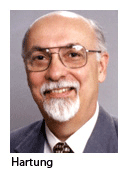With Dr. Bruce Hartung
Q: “Not that my faith is dead, but … I do not feel the same passion I once felt in my faith.”
A: This is one sentence of a much larger communication from a writer I quoted in previous months’ columns — in this year’s July, August, and September issues  of Reporter.
of Reporter.
Reader responses have been plentiful, with a lot of sharing about similar circumstances having to do with spiritual dryness or lack of passion-once-felt. There also have been some expressions that encourage a more tough-it-out response.
Since a number of readers wrote extensively about this topic, it clearly deserves more than even a few columns in Pressure Points. I believe that our readers have identified a substantive and central concern.
In this month’s column, I am sharing some of our readers’ observations and hope that they also might be helpful to you.
First, here are two general and big-picture comments:
- “I think [the teacher who originally wrote] is simply experiencing the normal dryness of the spirit that is the reality in which we live: We need God – our spirits need His Spirit. We naturally feel dry without Him. That is a continuing reality. If we do not drink/feed on His Word and Spirit regularly, then we will experience a growing and increasing hunger/thirst. … God’s Spirit comes to us through the means of His Word in order to bring us all the benefits of Christ and to feed our faith. Our faithful response, therefore, is to attend to that Word regularly, often, for significant chunks of time, and in a distraction-free setting. That quite simply is the spiritual reality of it.”
- “It is a daily thing. The answer is found in the ‘little things’ — spending every day just reading and pondering God’s Word. Also, it is good to find another person to confide in, to lean on, to be accountable to, and to be challenged by. We may need to be this person for someone else. Keeping the ‘fire’ burning is not our personal task. The Holy Spirit, through the means of Word and Sacrament, through His body the Church (uniting us together) does provide for this. … He gives us the means, the gifts, to accomplish this very task. The answer is found in leaning on Him and walking in His ways.”
Second, what specific suggestions have some of our readers made?
- “Don’t beat yourself up about this. It is a natural response of a child of God in this world. Look, rather, for where God feeds and nourishes you. Look to and lean on Christ.”
- “A rhythm of rest must be re-established if we, as leaders, are to move in the power of the Lord and not serve with a self-imposed limp. Weekly rhythms of rest through a Sabbath rest and yearly rhythms of rest [are] found in periodic personal retreats.”
- “As one who has struggled with this matter, I have always felt a great loss in not having been able to identify a confessor with whom to practice what Dr. Luther himself found so valuable, if not indispensable — individual confession and absolution. I hope that you might be willing to encourage a revival of that powerful source of renewal which seems so generally ignored.”
- “Connect with others — prayer partners, spiritual guides, peers — where you can discuss spiritual matters in depth and with mutual care.”
- “Delve into some of the ancient spiritual practices of the church — lectio divina [meditative Scripture reading], practicing the presence of God, meditation, study, and the like. There are dozens of texts and Web sites that can give you helps in this area.”
- From a veteran pastor: “The Bible passage is true: ‘My strength is made perfect in weakness.’ Now that I am old and weak, I ask God for help in all my problems.”
- “Thank God for this ‘suffering’ of a faith challenge. Thank God for all the challenges of this life, that God might use them to draw one closer to Him.”
We can take spiritual dryness for what it is — a natural call to spiritual renewal. We can use it as an impetus to draw closer to the sources of our nourishment, as we are drawn again and again to Christ by the action of the Holy Spirit. Even though we may feel less passion, Christ never gives up His passion for us.
I suspect that with this month’s column, we will not be done with this discussion. My hope is that this discussion will be continued in many church worker conferences, in small groups, and in our congregations.
Rev. Bruce M. Hartung, Ph.D., is dean of Ministerial Formation at Concordia Seminary, Saint Louis. He can be reached at hartungb@csl.edu.
Posted Oct. 2, 2009



